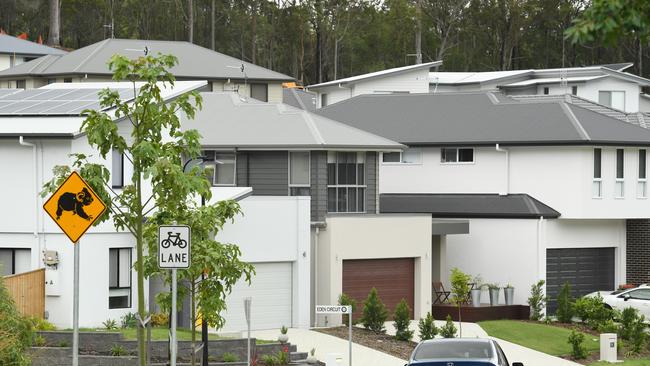Housing price slump drag on economic growth
A 10 per cent slump in national house prices this year is forecast to drag economic growth lower.

A 10 per cent slump in national house prices this year is forecast to drag economic growth lower, as knock-on effects hit consumer spending and housing investment, knock a hole in state government balance sheets and even slice the incomes of real estate agents.
Last night’s budget papers warn that house price swings will ripple across the economy, curbing spending on household goods and demand for imports, as well as hurting consumer confidence.
The nation’s housing market has been on shaky ground for more than 12 months, with prices falling and buyers disappearing.
The health of the sector is also set to be a hot-button election issue, as Labor pushes ahead with plans to scrap negative gearing tax breaks for all but new housing from January and halve the capital gains tax discount.
The budget papers predict that investment in houses and apartments will turn sharply negative over the next two financial years.
The papers outline the consequences of a 10 per cent fall in house prices, saying such a drop would trigger a 0.5 per cent decline in real GDP growth. “To the extent that housing turnover is affected, movements in housing prices also affect spending on household goods such as furnishings,” the papers say.
“There are other channels through which housing prices can affect the economy. For example, the incomes of real estate agents are correlated with housing prices and turnover, as are state government revenues from stamp duty.”
The small and medium business sector is also caught up in the house price spiral, as many rely on their home for collateral when borrowing to grow their company.
“The precise magnitude of the effect of housing prices on the economy is difficult to estimate,” the papers say. “The recent decline in Australian housing prices has followed several years of strong price growth and, unusually, is occurring alongside generally strong labour market conditions, rising incomes and low interest rates.”
Analysts at investment bank UBS have argued predictions such as those in the budget are too conservative, suggesting much larger house price falls and a credit squeeze that will take the market a long time to recover from.
As at February, capital city house prices had fallen 8.6 per cent from their most recent peak in September 2017. More recent industry data puts the price declines in Sydney at about 10 per cent, with Melbourne not far behind.
Budget predictions for investment in house and apartment building over the next two financial years are dire: tipped to grow at 0.5 per cent in the 12 months ended June 30, helped by a pipeline of work on projects. That is markedly slower than the five years earlier, which averaged annual growth of 5.5 per cent.
In 2019-20, housing investment is forecast to go backwards by 7 per cent before easing to a 4 per cent decline the following year. The papers say feedback pointed to “softer investment intentions” as confidence remained low and finance harder to obtain.
The government attributes some of the drop in demand to tighter credit conditions, a decline in interest from foreign buyers and measures imposed by the banking regulator to boost the quality of lending.
The papers highlight that, over the long term, housing prices should have “a limited effect on the size of the economy”.
This financial year, the household consumption forecast has been downgraded to 2.25 per cent, with that expected to rise to 2.75 per cent growth in 2019-20.
The savings ratio of households is expected to be “broadly steady” over the forecast period.





To join the conversation, please log in. Don't have an account? Register
Join the conversation, you are commenting as Logout